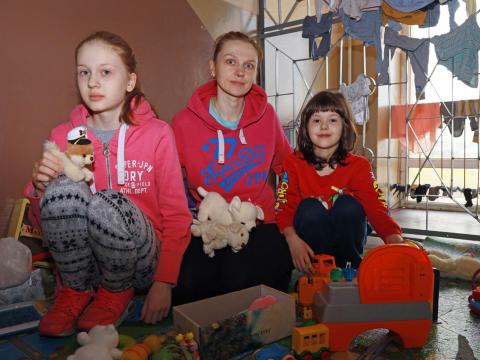Ukrainian refugee children face long-term consequences from disrupted schooling

- Ukraine refugee numbers hit 6 million less than three months since conflict began
-
3.6 million children have been affected by school closures and attacks
-
Need for basic food and hygiene supplies within Ukraine increasing at a rapid rate
20th May, 2022 - More than two-thirds of children in Ukraine have been displaced from their homes since the start of the conflict, leading to significant interruptions to regular schooling.
Three months of political insecurity in Ukraine has extended the disruptions to education due to the COVID-19 pandemic for children, as millions have fled and schools in the country have moved back online. The interruptions to education can have long-term consequences for children’s development which, if not urgently addressed, could take years to recover from. This is especially problematic for younger children who may miss the opportunity to develop foundational skills.
Already, three months of missed education could reduce children’s average testing scores by up to 11%. This is made worse for children from Ukraine who are also dealing with the added stress and emotional struggle of becoming refugees and the trauma of witnessing violence. There are fears that the coming summer holidays may see a surge in mental health needs, as the small reassurance coming from online lessons stops.
Furthermore, the longer a child is excluded from the education system, the less likely they are to ever return, which poses potentially dramatic consequences for their futures.
Eleanor Monbiot, OBE, World Vision’s Regional Leader for Eastern Europe, said: “Over the last two years, children all over the world have already endured unprecedented disruptions to their education due to the global COVID-19 pandemic. For refugee children, this problem is going to be exacerbated even further by the effects of conflict, potentially resulting in long-term damage to their development, opportunities, and even future earning potential, if not managed properly.”
“Children and young people are the least responsible for the events surrounding conflict and political instability but are often the most deeply affected by it. For Ukrainian children to be able to fully recover from the trauma of the ongoing conflict, returning them to stable education must be considered an absolute priority.”
Last week in Bucharest, World Vision opened its first ‘Happy Bubbles’ centres for refugee children and mothers to access informal education and psychosocial support. The project is a sustainable partnership within host communities to provide a package of integrated community-based services tailored to the needs of the individuals - children and parents - who are refugees from the war in Ukraine.
ENDS
Notes to Editor
World Vision is a Christian humanitarian organisation dedicated to working with children, families and their communities to reach their full potential by tackling the root causes of poverty and injustice. World Vision serves all people, regardless of religion, race, ethnicity or gender. For more information, please visit www.wvi.org or follow us on Twitter @WorldVision
For further information or to organise an interview, please contact: Leah Donoghue at leah_donoghue@wvi.org